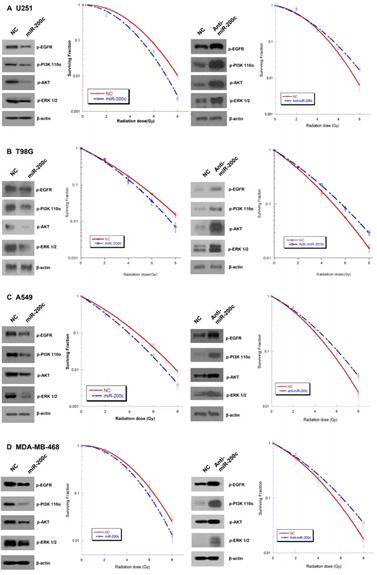글로벌 연구동향
방사선생물학
- 2017년 08월호
[Oncotarget.] MicroRNA-200c increases radiosensitivity of human cancer cells with activated EGFR-associated signaling.서울의대/ 구태률, 조봉준, 김인아*
- 출처
- Oncotarget.
- 등재일
- 2017 Jul 3
- 저널이슈번호
- doi: 10.18632/oncotarget.18924. [Epub ahead of print]
- 내용

AbstractMicroRNA-200c (miR-200c) recently was found to have tumor-suppressive properties by inhibiting the epithelial-mesenchymal transition (EMT) in several cancers. miR-200c also interacts with various cellular signaling molecules and regulates many important signaling pathways. In this study, we investigated the radiosensitizing effect of miR-200c and its mechanism in a panel of human cancer cell lines. Malignant glioma (U251, T98G), breast cancer (MDA-MB-468), and lung carcinoma (A549) cells were transfected with control pre-microRNA, pre-miR-200c, or anti-miR-200c. Then, RT-PCR, clonogenic assays, immunoblotting, and immunocytochemisty were performed. To predict the potential targets of miR-200c, microRNA databases were used for bioinformatics analysis. Ectopic overexpression of miR-200c downregulated p-EGFR and p-AKT and increased the radiosensitivity of U251, T98G, A549, and MDA-MB-468 cells. In contrast, miR-200c inhibition upregulated p-EGFR and p-AKT, and decreased radiation-induced cell killing. miR-200c led to persistent γH2AX focus formation and downregulated pDNA-PKc expression. Autophagy and apoptosis were major modes of cell death. Bioinformatics analysis predicted that miR-200c may be associated with EGFR, AKT2, MAPK1, VEGFA, and HIF1AN. We also confirmed that miR-200c downregulated the expression of VEGF, HIF-1α, and MMP2 in U251 and A549 cells. In these cells, overexpressing miR-200c inhibited invasion, migration, and vascular tube formation. These phenotypic changes were associated with E-cadherin and EphA2 downregulation and N-cadherin upregulation. miR-200c showed no observable cytotoxic effect on normal human fibroblasts and astrocytes. Taken together, our data suggest that miR-200c is an attractive target for improving the efficacy of radiotherapy via a unique modulation of the complex regulatory network controlling cancer pro-survival signaling and EMT.
Author information
Koo T1, Cho BJ2, Kim DH2, Park JM1,2, Choi EJ2, Kim HH2, Lee DJ2, Kim IA1,2,3,4.
1Department of Radiation Oncology, Graduate School of Medicine, Seoul National University, Seoul, Republic of Korea.2Medical Science Research Institute, Seoul National University Bundang Hospital, Seongnam, Republic of Korea.3Department of Radiation Oncology, Seoul National University College of Medicine, Seoul, Republic of Korea.4Cancer Research Institute, Seoul National University College of Medicine, Seoul, Republic of Korea.
- 키워드
- EGFR-associated signaling network; human cancer cells; micro-RNA 200c; radiosensitization
- 연구소개
- 유전자 전사 후 단계에 작용하여 종양의 발생과 진행을 억제하는 microRNA 중 하나인 microRNA-200c (miR-200c)에 대한 논문입니다. Mir-200c는 epithelial-mesenchymal transition (EMT)를 억제하여 종양의 성장을 억제하며, 세포 신호전달체계의 중요한 조절인자 중 하나로 알려져 있습니다. 본 연구에서는 malignant glioma (U251, T98G), breast cancer (MDA-MB-468), lung carcinoma (A549) 세포주에 miR-200c를 transfection 한 후 radiation-induced cell killing이 증가함을 보였습니다. MicroRNA database를 활용하여 miR-200c의 target gene 후보로 EGFR, AKT2, MAPK1, VEGFA, HIF1AN를 선정하고 실제로 miR-200c가 해당 유전자 발현을 억제함을 확인하였습니다. 마지막으로 miR-200c가 종양 전이와 연관된 invasion, migration, vascular tube formation을 억제함을 보였습니다. 이처럼 miR-200c는 종양의 성장 및 EMT를 억제하는 특징이 있으며, 이는 방사선치료의 효과를 높일 수 있는 좋은 target이 될 수 있음을 보여주는 결과라 할 수 있겠습니다.
- 덧글달기
- 이전글 [Biomol Ther (Seoul). ] A Benzylideneacetophenone Derivative Induces Apoptosis of Radiation-Resistant Human Breast Cancer Cells via Oxidative Stress.
- 다음글 [Cytotherapy. ] Human umbilical cord blood-derived mesenchymal stromal cells and small intestinal submucosa hydrogel composite promotes combined radiation-wound healing of mice.








편집위원
MicroRNA-200c가 심각한 부작용 없이 방사선 치료에서의 효율을 높일 수 있다는 점이 흥미롭습니다. 또한 종양부위에만 증착되어 방사선 치료의 효율을 보다 더 배가 하는 것에 대한 연구 진전도 매우 궁금합니다.
덧글달기닫기2017-08-03 16:51:30
등록